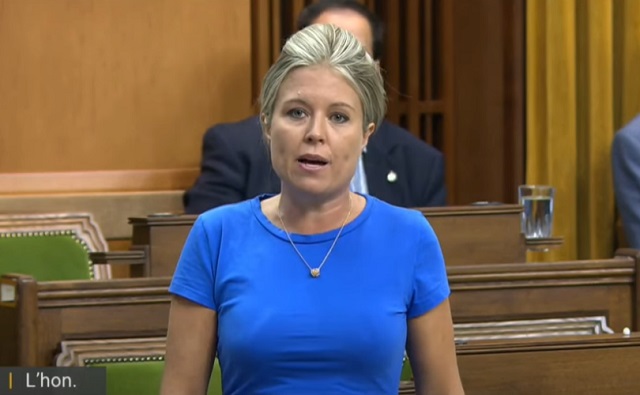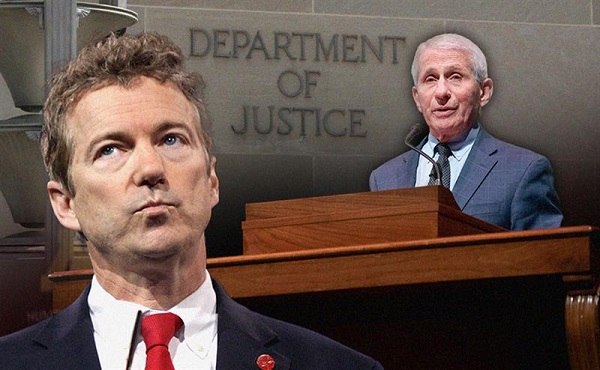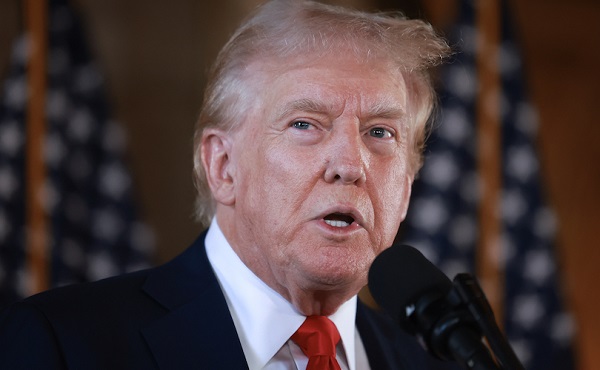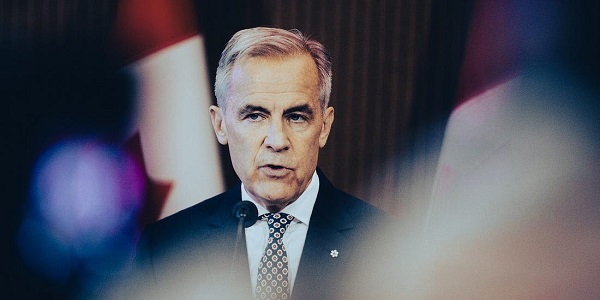Censorship Industrial Complex
Conservatives to introduce bill that aims to ‘expressly prohibit’ digital IDs in Canada

From LifeSiteNews
MP Michelle Rempel Garner said the goal is to ‘protect the most vulnerable Canadians without creating a government-managed surveillance state or restricting Charter-protected speech.’
Canada’s Conservative Party promised to introduce a new online harms bill that will counter legislation from Prime Minister Justin Trudeau’s Liberals that aims to further clamp down on online speech.
Conservative MP Michelle Rempel Garner, speaking to reporters on September 12, said the new Conservative bill will “protect Canadians online” and preserve “civil liberties.”
“After nine years of Justin Trudeau, the NDP-Liberal coalition has failed to put forward any legislation that will protect Canadians online without infringing upon their civil liberties,” she said, adding that “Canadians are paying the price for this failure.”
Rempel Garner added that online criminal behaviour is “still rampant” in Canada, “yet the Liberals’ only response has been to table two censorship bills, forcing Canadians to choose between their safety and free expression.”
In a blog post about the forthcoming legislation, Rempel Garner observed that “for nearly a decade, the Liberals have presented Canadians with a false dichotomy; that they should have to water down their civil liberties to be protected online.”
She made a direct reference to the Liberal’s Bill C-63, or the “An Act to enact the Online Harms Act, to amend the Criminal Code, the Canadian Human Rights Act and An Act respecting the mandatory reporting of Internet child pornography by persons who provide an Internet service and to make consequential and related amendments to other Acts.”
Bill C-63 was introduced by Justice Minister Arif Virani in the House of Commons in February and was immediately blasted by constitutional experts as troublesome. Put forth under the guise of protecting children from exploitation online, the bill also seeks to expand the scope of “hate speech” prosecutions, and even desires to target such speech retroactively.
Trudeau’s law, which is in the second reading, also calls for the creation of a Digital Safety Commission, a digital safety ombudsperson, and the Digital Safety Office, all tasked with policing internet content.
Rempel Garner promised the Conservative’s online harms bill will “introduce protections in three areas of focus,” and will “protect the most vulnerable Canadians without creating a government-managed surveillance state or restricting Charter-protected speech.”
“To be clear, this update won’t criminalize something like two people disagreeing about policy online, or other types of expression of opinion that is protected under the Charter, which Liberal Bill C-63 will undermine,” Rempel Garner noted.
“Specifically, the provision in our new Conservative legislation will be based on the existing definition of criminal harassment, applying specifically to those who repeatedly send unwanted, harassing content that causes someone to reasonably fear for their safety or well-being.”
Conservative bill will not mandate Digital IDs for internet use
Rempel Garner observed that the new bill will have provisions to protect minors and will criminalize the sharing of “intimate” photos without a person’s consent, as well as “deep nudes” (AI images that look real), as well as the sharing of pictures or video of sexual assault.
“The legislation will outline in detail how operators must comply with and operate under this duty of care, including reporting requirements, marketing prohibitions, and other items. Operators who don’t comply with these provisions will face steep fines and a private right of action,” she said.
Rempel Garner said the Conservative’s new bill will look to implement privacy-preserving and “trustworthy age verification methods (for example, computer algorithms that ensure reliable age verification) to detect when a user is a minor,” to be able to restrict access to any “content that is inappropriate for minors to such users while expressly prohibiting the use of a Digital ID for these purposes.”
In June, Rempel Garner said Trudeau’s Bill C-63 is so flawed that it will never be able to be enforced or come to light before the next election.
C-63’s “hate speech” section is accompanied by broad definitions, severe penalties, and dubious tactics, including levying preemptive judgments against people if they are feared to be likely to commit an act of “hate” in the future.
Details of the new legislation also show the bill could lead to more people jailed for life for “hate crimes” or fined $50,000 and jailed for posts that the government defines as “hate speech” based on gender, race, or other categories.
Jordan Peterson, one of Canada’s most prominent psychologists, accused Trudeau’s Bill C-63 of trying to create a pathway to allow for “Orwellian Thought Crime” to become the norm in the nation
Business
Trump slaps Brazil with tariffs over social media censorship

From LifeSiteNews
By Dan Frieth
In his letter dated July 9, 2025, addressed to President Luiz Inácio Lula da Silva, Trump ties new U.S. trade measures directly to Brazilian censorship.
U.S. President Donald Trump has launched a fierce rebuke of Brazil’s moves to silence American-run social media platforms, particularly Rumble and X.
In his letter dated July 9, 2025, addressed to President Luiz Inácio Lula da Silva, Trump ties new U.S. trade measures directly to Brazilian censorship.
He calls attention to “SECRET and UNLAWFUL Censorship Orders to U.S. Social Media platforms,” pointing out that Brazil’s Supreme Court has been “threatening them with Millions of Dollars in Fines and Eviction from the Brazilian Social Media market.”


Trump warns that these actions are “due in part to Brazil’s insidious attacks on Free Elections, and the fundamental Free Speech Rights of Americans,” and states: “starting on August 1, 2025, we will charge Brazil a Tariff of 50% on any and all Brazilian products sent into the United States, separate from all Sectoral Tariffs.” He also adds that “Goods transshipped to evade this 50% Tariff will be subject to that higher Tariff.”
Brazil’s crackdown has targeted Rumble after it refused to comply with orders to block the account of Allan dos Santos, a Brazilian streamer living in the United States.
On February 21, 2025, Justice Alexandre de Moraes ordered Rumble’s suspension for non‑compliance, saying it failed “to comply with court orders.”
Earlier, from August to October 2024, Moraes had similarly ordered a nationwide block on X.
The court directed ISPs to suspend access and imposed fines after the platform refused to designate a legal representative and remove certain accounts.
Elon Musk responded: “Free speech is the bedrock of democracy and an unelected pseudo‑judge in Brazil is destroying it for political purposes.”
By linking censorship actions, particularly those targeting Rumble and X, to U.S. trade policy, Trump’s letter asserts that Brazil’s judiciary has moved into the arena of foreign policy and economic consequences.
The tariffs, he makes clear, are meant, at least in part, as a response to Brazil’s suppression of American free speech.
Trump’s decision to impose tariffs on Brazil for censoring American platforms may also serve as a clear signal to the European Union, which is advancing similar regulatory efforts under the guise of “disinformation” and “online safety.”
With the EU’s Digital Services Act and proposed “hate speech” legislation expanding government authority over content moderation, American companies face mounting pressure to comply with vague and sweeping takedown demands.
By framing censorship as a violation of U.S. free speech rights and linking it to trade consequences, Trump is effectively warning that any foreign attempt to suppress American voices or platforms could trigger similar economic retaliation.
Reprinted with permission from Reclaim The Net.
Censorship Industrial Complex
Canadian pro-freedom group sounds alarm over Liberal plans to revive internet censorship bill

From LifeSiteNews
The Democracy Fund warned that the Liberal government may bring back a form of Bill C-63, which is aimed at regulating online speech.
One of Canada’s top pro-democracy groups has sounded the alarm by warning that the Canadian federal government is planning to revive a controversial Trudeau-era internet censorship bill that lapsed.
The Democracy Fund (TDF), in a recent press release, warned about plans by the Liberal government under Prime Minister Mark Carney to bring back a form of Bill C-63. The bill, which lapsed when the election was called earlier this year, aimed to regulate online speech, which could mean “mass censorship” of the internet.
“TDF is concerned that the government will try once more to give itself the power to criminalize and punish online speech and debate,” the group said.
“TDF will oppose that.”
According to the TDF, it is “concerned that the government intends to re-introduce the previously abandoned Online Harms Bill in the same or modified form.”
Bill C-63, or the Online Harms Act, was put forth under the guise of protecting children from exploitation online. The bill died earlier this year after former Prime Minister Justin Trudeau called the 2025 federal election.
While protecting children is indeed a duty of the state, the bill included several measures that targeted vaguely defined “hate speech” infractions involving race, gender, and religion, among other categories. The proposal was thus blasted by many legal experts.
The Online Harms Act would have censored legal internet content that the government thought “likely to foment detestation or vilification of an individual or group.” It would be up to the Canadian Human Rights Commission to investigate complaints.
The TDF said that Bill C-63 would have made it a criminal offense to publish ill-defined “harmful content.”
“It required social media companies to remove potentially harmful content or face punitive fines. Many defenders of civil liberty, including TDF, worried that the application of this badly defined concept would lead to mass surveillance and censorship,” the group said.
The TDF warned that under Carney, the government is “once again considering new or similar legislation to regulate online speech, with the Minister of Justice claiming he would take another look at the matter.”
Mark Joseph, TDF litigation director, pointed out that Canada already has laws that “the government can, and does, use to address most of the bad conduct that the Bill ostensibly targeted.”
“To the extent that there are gaps in the Criminal Code, amendments should be carefully drafted to fix this,” he said.
“However, the previous Bill C-63 sought to implement a regime of mass censorship.”
As reported by LifeSiteNews last month, a recent Trudeau-appointed Canadian senator said that he and other “interested senators” want Carney to revive a controversial Trudeau-era internet censorship bill that lapsed.
Another recent Carney government Bill C-2, which looks to ban cash donations over $10,000, was blasted by a constitutional freedom group as a “step towards tyranny.”
Carney, as reported by LifeSiteNews, vowed to continue in Trudeau’s footsteps, promising even more legislation to crack down on lawful internet content.
He has also said his government plans to launch a “new economy” in Canada that will involve “deepening” ties to the world.
Under Carney, the Liberals are expected to continue much of what they did under Justin Trudeau, including the party’s zealous push in favor of abortion, euthanasia, radical gender ideology, internet regulation and so-called “climate change” policies. Indeed, Carney, like Trudeau, seems to have extensive ties to both China and the globalist World Economic Forum, connections that were brought up routinely by conservatives in the lead-up to the election.
-

 Alberta2 days ago
Alberta2 days agoMedian workers in Alberta could receive 72% more under Alberta Pension Plan compared to Canada Pension Plan
-

 COVID-192 days ago
COVID-192 days agoSen. Rand Paul: ‘I am officially re-referring Dr. Fauci to the DOJ’
-

 Crime2 days ago
Crime2 days agoDEA Busts Canadian Narco Whose Chinese Supplier Promised to Ship 100 Kilos of Fentanyl Precursors per Month From Vancouver to Los Angeles
-

 Education2 days ago
Education2 days agoTrump praises Supreme Court decision to allow dismantling of Department of Education
-

 Business2 days ago
Business2 days agoCanada must address its birth tourism problem
-

 Business2 days ago
Business2 days agoConservatives demand probe into Liberal vaccine injury program’s $50m mismanagement
-

 International1 day ago
International1 day agoMatt Walsh slams Trump administration’s move to bury Epstein sex trafficking scandal
-

 National1 day ago
National1 day agoDemocracy Watch Blows the Whistle on Carney’s Ethics Sham




